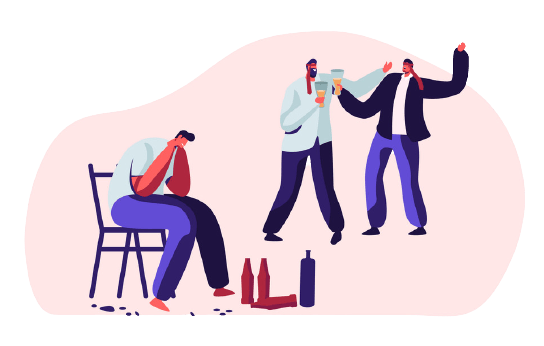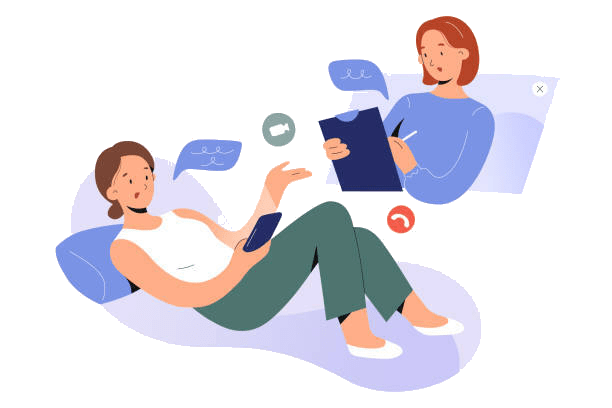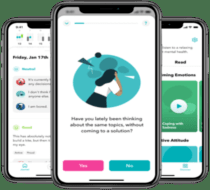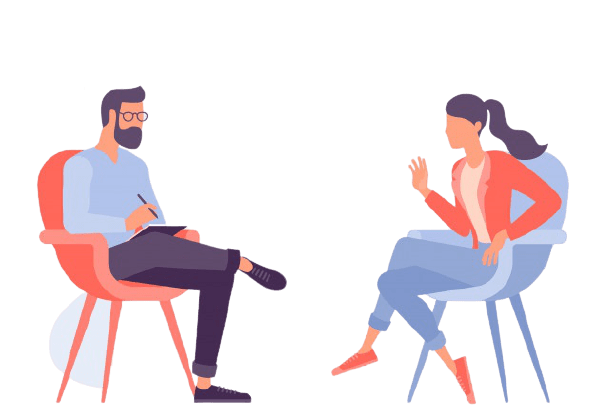Online Addiction Counseling | Best therapist for addiction help
- Affordable and confidential online addiction counseling sessions
- Video calls or chat sessions with Counsellors/ Psychologists specialized in addiction issues
- Improve your mental wellbeing whenever and wherever you want
Begin Therapy
Consult online with best Therapist
"*" indicates required fields
A ‘Better’ Model for addiction Counselling
Mantracare is with you on the journey to heal your addiction. We will help you right from knowing the root causes of your addiction to learning healthy coping mechanisms. Our therapies are 100% online and are conducted via video call or messages. So, feel free to take sessions wherever, whenever you need it
Specialized Therapists
As per your story and case, we assign the best counselors experienced in addiction issues. They work with you proactively to understand and address the root cause of your addiction, hopelessness, and persistent sadness.
Affordable & Effective
We believe that therapies should be driven more by “Need” than “ability to pay”. Our online sessions are 90% less expensive than face-to-face therapy. Online counseling starts at just $10.
Addiction Self Care
We provide you continuous addiction help with self-care tools, mental healing videos, chat groups, meditations, breathing exercises, and more. Our therapists are available 24/7 via messages to provide care, whenever and wherever you need it.

Best addiction Counselling, Now in Your Pocket
Our therapists our counselors are available in all parts of the world, accessible via an easy-to-use mobile application. Our matching experts take your preferences into consideration and connect you with therapists specializing in addiction issues. Moreover, there are hundreds of free self-help tools on our app, available 24×7.

How It Works
After filling out our questionnaire, you will be matched with an addiction counselor based on your needs and preferences. You and your counselor will get your own secure and private “therapy room” where you can message your counselor at any time wherever you are. You can also schedule a session so speak live with your counselor over video or phone.
You can write or talk about addiction, the things going on in your life, ask questions, and discuss the challenges you’re facing and your counselor will provide feedback, insights, and guidance. Together you’ll work towards making a positive change in your life, accomplishing your goals, and overcoming your addiction.

Signup for addiction counseling
Just fill up a 5-minute online form to tell us about your addiction symptoms and treatment expectations.

Meet your Therapist
Based on your preferences and neet, we will connect you with addiction counselors that are available 24/7 to you via call or chat.

Connect to our app
Heal yourself with video or chat counseling sessions available in the app. Access helpful self-care tools on our app to help you heal your addiction, and take control of your life
Meet the best addiction Therapists
MantraCare psychologists help you counter addiction through a combination of positive conversations, exercises, and meditations. Our addiction therapy services are better than traditional face-to-face counseling in multiple ways:
- Over 5,000 counselors & therapists with expertise in addiction and other areas
- All counselors are licensed, trained, accredited, and highly experienced
- Match with an available counselor who is the best fit for your addiction needs
- Unlimited private one on one communication with your therapist
- Gain access to constructive, educational group webinars on addiction

A Guide on Addiction
What is addiction?
Addiction is apraxia that is often associated with certain psychological and neurological processes. Addiction is described as a dependence on a substance or behavior for the sake of the desired reward. Addiction is also often associated with social, emotional, or demographic factors.
Types of addiction
One of the biggest challenges facing addicts today is recognizing the addiction types that they have developed. There are many different ways that an individual can fall into an addiction such as:
- drugs,
- gambling,
- work,
- shopping,
- sex,
- pornography,
- and a host of others.
These addiction types often develop over the course of time or in certain circumstances. However, there are some commonalities among all addiction types. For instance, substance addiction is a common problem. The following is an explanation of these addiction types.
Addictions Based on Physical Dependency:
The most difficult addiction type for a person to overcome is a physical dependency. Physical dependency occurs when a person has a physical need met and cannot live without the object of their addiction. Drug addicts can become physically dependent on drugs in order to function normally. This type of dependency is extremely difficult to break and requires the assistance of a medical professional. In addition, some drug-addled individuals will experiment with other substances in order to feel psychologically “normal”.
Addiction based on Psychological Dependency:
The next most common addiction type is psychological dependence. Psychological dependency is not so much related to a substance like a drug, but more to the behaviors that are required in order to maintain a healthy lifestyle. People who suffer from this type of psychological dependence will experience a number of psychological symptoms such as cravings, mood swings, irritability, depression, and even paranoia. If left untreated, psychological dependence can lead to physical dependency as well.
Symptoms of Addiction:
When someone decides to become dependent on drugs or alcohol, the physical addiction is what usually begins. Symptoms of addiction include:
- restlessness,
- overeating,
- sleeping issues,
- irritability,
- headaches,
- nausea,
- vomiting,
- anxiety,
- and tremors.
Unfortunately, there are many people who do not recognize their addiction and their symptoms until it is too late and their health has greatly deteriorated. The worst part about addiction is that once you are addicted, there is no way to get out of it once you have gotten into it.
Other health conditions related to Addiction:
Many of the co-occurring mental health conditions that are common in individuals who are suffering from addiction are:
- anxiety,
- depression,
- bipolar disorder,
- psychosis and
- schizophrenia.
Most individuals who are experiencing these conditions are going through significant emotional and physical addiction and are dealing with an addiction to a substance use disorder or a situation that causes the addiction.
Why do you need Addiction Therapy?
One of the primary reasons that people enter into an addiction therapy program is because they are unable to function on their own. They have experienced a trauma or a traumatic event and their mind is not able to cope with the addiction that they are experiencing.
Substance use disorder or addiction is not something that should be entered into lightly. It is an illness that requires treatment in order for the patient to recover and to maintain a healthy lifestyle.
Addiction treatment programs can help people to deal with the trauma and the underlying causes of their illness so that they do not harm themselves or others again.
Mantra Care providers feel that after finishing treatment for an addiction therapy program, individuals will gain access to healthcare providers who are able to provide them with additional support if they need it.
Mantracare helps its clients in the following ways:
- Teach patients to take responsibility for their problems.
- Helps people develop skills for coping with addiction, anger, depression and anxiety. Teaches them how to change their thoughts and to learn new ways of thinking when it comes to making decisions.
- Helps people to understand and change their patterns of behavior and
- Helps to create a safe space for them in which they are able to live their lives without any addiction or fear.
No matter what addiction therapy modality is chosen, Mantra Care healthcare providers are always looking for ways to help improve the overall health and the quality of life of their patients.
Addictions are usually diagnosed during childhood or early adolescence. Addiction results from compulsive behavioral responses to negative stimuli which can include exposure to environmental irritants and addictions.
Treatment for Addiction
Medications:
A common addiction treatment approach involves medications to control or reduce the craving for the substance or behavior. Individuals with addiction may have cravings for a substance even without the presence of external cues such as money, alcohol, or drugs. Medications that are used as addiction treatments may provide relief from the cravings and help individuals break free from substance abuse. These medications include Clonidine, Orlistat, and Zoloft. Clonidine is an antipsychotic drug that is used to treat patients with moderate to severe addiction to cocaine, heroin, and alcohol.
Clonidine:
This is not a very effective addiction treatment when it is used alone because it does not affect the brain chemistry that is responsible for substance abuse. As a result, Clonidine can become dependent upon these substances in order for it to be effective. Orlistat and Zoloft are both used as addiction treatments that can lead to improvement in the patient’s physical and psychological health while they are attempting to become dependent, less upon alcohol and other drugs. Both Orlistat and Zoloft have a monoamine oxidase inhibitor (MAOI) that decreases the amount of serotonin in the brain and therefore helps in treating substance addictions.
Addiction Therapy:
Addiction therapy is a common treatment for addiction. It is offered in both inpatient and outpatient formats. Inpatient treatment is when you leave the treatment facility while in the outpatient mode you are still required to report to the treatment facility. Both of these therapies attempt to treat the different mental health issues that are connected with addiction.
Addiction therapy involves different types of interventions such as
Counseling: Counseling is used in order to provide individualized care and to educate the patient on their behaviors and patterns.
Group Therapy: Group therapy is often used in conjunction with counseling and family therapy in order to address the problems that people have within their relationships and their employment.
Psychotherapy: Psychotherapy is used in order to identify the thoughts and beliefs that are limiting a person’s ability to overcome their addictions.
CBT or Cognitive Behavioral Therapy: This is usually provided by a healthcare provider. With this type of treatment, individuals are given the tools to recognize their cravings and to control them so that they do not harm their bodies or their lives. CBT may also incorporate such techniques as muscle relaxation or hypnotherapy.
Some other types of interventions are family therapy and psychoanalysis.
Complications of Addiction:
When a substance is abused, there are often mental disorders that develop as a result of the abuse. These mental disorders develop over a period of time, with some cases developing after the person stops abusing the substance. Some mental illnesses that can occur as a result of addiction to various substances include bipolar disorder, hallucinations, mania, and depression. In many cases, the intensity of the mental disorders that develop as a result of addiction affects their ability to maintain a healthy and productive life. In addition to mental illnesses, there are also physical complications that develop as a result of addiction, including organ damage, bone deterioration, decreased kidney function, and heart problems.
Addiction can also negatively affect your mental health as well. Because a person becomes psychologically addicted, they often have problems with:
- pain management,
- feelings of sadness
- and feelings of helplessness.
Addicted individuals also tend to lose interest in things they normally enjoy, such as hobbies, friends, and recreational activities. As a result, addicts may engage in dangerous behavior such as street drug dealing, criminal activities, and even suicide.
Addiction affects everyone differently, so it is up to you as a concerned parent to try to help them find treatment so that they can avoid harmful behaviors and overcome addiction.
If you are looking for support and assistance, connect with Mantra Care Online Addiction Therapy to battle it. The program can give you a lot of information and resources to help you understand addiction and what it can do to your life and others.
10,000+ Happy & Healed CBT patients

“I am a working professional and it’s tough to attend physio sessions regularly. After suffering from a backache for around three years, my friend suggested that I try Mantra Care for their physiotherapy services. I was able to get completely back pain relief, after taking a completely online course. Thanks to my PT at MantraCare for this, who conducted sessions whenever I needed them.”
Kevin, 1 year on MantraCare
5000+ Depression Counselors from across the world








Our therapists take care of your ‘unique’ needs
Not all mental health problems are the same. Different types of problems require different treatments. At MantraCare, 5000+ therapist’s cover a range of specialities to meet your needs:
Frequently Ask Questions
Addiction is described as a dependence on a substance or behavior for the sake of the desired reward. Addiction is also often associated with social, emotional, or demographic factors.
Addiction is actually a biological, psychological, social, cultural, or spiritual problem. Sometimes, it may be called a disease also, depending upon its severity.
According to the National Institutes of Health, the following are risk factors:
- Aggressive behavior in childhood This risk factor is most commonly found in infancy.
- Parental monitoring is minimal.
- Peer-to-peer drug and alcohol addiction is common.
- Drug accessibility
- Low-wage workers
There are a lot of ways which can come if you are addicted to something or not. Just try to find out the severity of your dependency to anything, any person, or any situation. If you are not able to restrict yourself even if any on these is harming you, you have an addiction.
Addiction does not only affect your physical well-being, it does harm your mental being also.
Yes, overeating or compulsive overeating is a kind of addiction.
Online addiction therapy has been proven to have the same effectiveness as in-person therapy. There are multiple reasons why online counselling proves to be better:
No need to travel to a psychologist, sit on the same couch, and talk with the same therapist. Online addiction therapy doesn’t require that you leave the comforts of your home or office. Talk to your therapist in your pajamas, sitting on your bed!
Most of us live hectic, unbalanced lives wherein scheduling a traditional therapy session becomes prohibitive. Online addiction therapy allows you to set the time, location, and initial direction of the therapeutic relationship. It’s the freedom that puts you, the client seeking mental health solutions, first.
We offer a vast array of free self-help tools such as addiction & anxiety control exercises, relaxation techniques, mindfulness exercises, and helpful blogs. We also offer mental healing videos, chat groups, breathing meditations, and more, available 24/7 at no charge. However, there is a nominal price for addiction counseling. That said, we provide one of the most affordable ways to tackle addiction.
The cost of addiction counseling through MindMantra ranges from $15 to $40 per week. Unlike traditional in-office therapy which can cost over $150 for a single session, your MindMantra membership includes unlimited text, video, as well as audio messaging.

